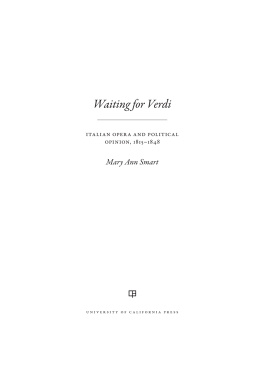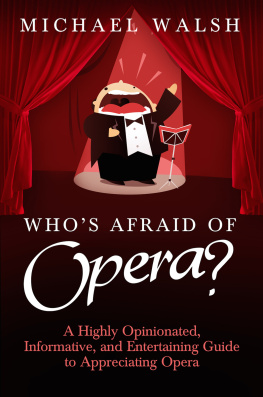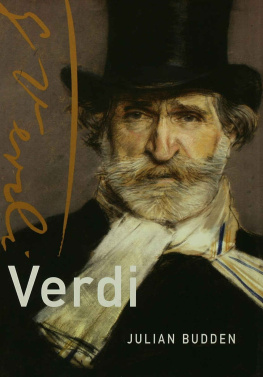This book is more a tribute to Verdis librettists than to Verdi himself, for it concentrates exclusively on the dramatic content of the operas, making virtually no reference to the music. This is entirely intentional. There are ample books available which give comprehensive musical exegesis, notably those of Charles Osborne and Julian Budden. Both authors have published exemplary studies of Verdis operas with copious reference to, and examples from, the music and with appropriate biographical information. If you turn to the New Grove Dictionary of Opera you will find that the plot summaries are peppered with allusions to musical structure and harmonic nuance. This is admirable if you are musically literate and are already familiar with the plot outlines but makes about as much sense to the uninitiated as Egyptian hieroglyphics.
In a letter which Verdi wrote to his librettist, Francesco Piave, the composer makes clear his position with regard to the libretti he set. Verdi was writing to defend his determination that the character of Triboletto (to become Rigoletto) should, against the censors wishes, remain a hunchback in his opera: It was precisely because of these original and characteristic traits that I chose the subject, and if they are cut out I shall not be able to write the music. If I am told that my music will do just as well for this drama as for the other, I must answer that I do not understand such reasoning. I tell you frankly that my music, whether good or bad, is never fortuitous [my italics], and that I always try to give it a distinct character.
In other words it is the precise nature of the scenario that stimulates Verdi to write the music. Change that scenario in any particular and the music will change accordingly. For some this may sound too obvious to be even worth stating. But it is my experience that it cannot be stated often enough. The opera composer is a very different sort of animal from the instrumental composer. Verdi, like Wagner, devoted himself almost exclusively to the medium of opera. As with Wagner it is clear that it was Verdis unique sensibility as a dramatist that not only contributed to but actually constituted his musical genius. The words of the libretti Verdi set cannot therefore be dismissed as merely an irritating adjunct to the glories of the music he composed for they, and the situations they invoke, are not just an integral part of the musical design, but entirely responsible for it. If we truly want to understand the music we must understand the drama behind the music; not just at a superficial level scanning through the details of the plot five minutes before the curtain rises in the theatre but through understanding precisely what motivates each character at any given moment.
The facts of a plot are easily laid down. A characters motivation is not always so easy to pin down, particularly if the original source has been severely truncated in order to satisfy the exigencies of the operatic stage. Nevertheless I early determined to take each libretto on its individual merits and not to be tempted into lengthy digressions on where libretto and source converge or diverge. Excellent source books already abound. When it comes to psychological motivation there is always an abundance of possible interpretations. The conclusions that I come to about individual characters are unashamedly subjective, and if they do no more than stimulate thought and debate or even violent dissent -1 shall rest content.
Many of Verdis libretti have been condemned as having no literary merit, of being banal, inept even. Yet the fact remains that they elicited a wealth of great music from the composer. The libretto which has traditionally come in for the most criticism is that of Il Trovatore. And yet this is the work which the Italian conductor, Gianandrea Gavazzeni, referred to as the Italian St Matthew Passion. It is undeniably a great opera. How we judge a work of art depends on the criteria we employ when apprehending it. Often critics and commentators will, wittingly or not, judge a libretto by the light of the classical unities, which remain as instinctive in dramatic art as does the golden mean in figurative painting. Clearly by these lights the vast majority of operatic libretti will fall short in the same way as the novels of Dostoevsky will fall short if expected to conform to the elegant coherence of a novel by Jane Austen. But Dostoevskys aims were a whole universe away from those of Jane Austen.
A librettists aims are simple: to stimulate a composers inspiration. He must, by definition, play second fiddle. If a librettist presents a composer with a polished work of art there is going to be nothing that the composer may add. Wagner and Mussorgsky solved the problem by writing their own libretti (as has Sir Michael Tippett in more recent times). There are many who might argue that it would have been better if they hadnt, or at least that someone better qualified should have been called in to prune away the unessentials. But the words that they wrote are the words that stimulated their genius. Verdi may not have written his own libretti but he took an entirely proactive stance towards their creation, as can be seen from even a cursory glimpse at his correspondence with his librettists. He knew what he wanted and he usually got it.
The libretti of Solera are considered to be inferior to those of Piave, Cammarano etc. and yet they supplied Verdi with broad and trenchant themes with a high moral content that were ideally suited to Verdis specific genius. In this respect I cannot do better than quote Andrew Porter in an essay included in the libretto accompanying the Philips recording of I Lombardi:
And yet our view of the theatre, and of the diverse techniques by which theatrical experiences may be constructed, has changed so much that today after the teachings of Artaud, of Brecht, of Piscator (Soleras) libretto of I Lombardi








